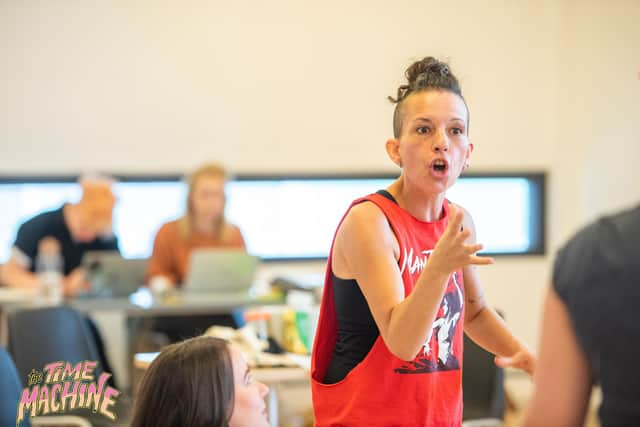Jordan & Skinner on their feminist retelling of The Time Machine
HG Wells was a visionary. It is not only that his 1895 novella introduced the phrase “time machine” to the language, it is also that his imagined future identified the flaw in early capitalist thinking.
The Time Machine takes us to the year 802,701, by which point the human race has split into two factions. Above ground live the Eloi, a tribe of small stature and naive outlook, living a life of ease. Below ground are the Morlocks, an unfortunate breed of workers, who feed and clothe the Eloi. It is the class system taken to its logical limit.
Advertisement
Hide AdIn today’s era of haves and have-nots, where the rich get tax cuts and the poor wonder how to pay their bills, his book seems all the more prescient. “It’s really scary,” says actor Melanie Jordan. “We meet these two species when the Morlocks are starting to revolt and to eat the Eloi. Humans are eating each other – it’s awful. We started looking at this a few years ago when Brexit was a thing and Trump was in power and for the first time, the future felt apocalyptic. The more time has passed, the more true the book has felt.”


But like all of us, Wells was a man of his time. Reading the book today, Jordan sees something obvious that would not have occurred to the author: “It’s important to say HG Wells’s story is all men.”
That is why when she and theatre director Caitlin Skinner, her collaborator in feminist theatre company Jordan and Skinner, started thinking about The Time Machine in 2017, they were conflicted. On the one hand, here was a pioneering piece of fiction, as radical in its ambition as it was in its politics. On the other, this was a book that did not reflect their experience as 21st-century women.
“The book is about wealthy Victorian men who are excited about the future, the industrial revolution and human progress,” says Jordan. “It’s interesting for us to think about how their ideal future compares to a feminist Utopian future.”
Their contradictory reactions to the book have given rise to The Time Machine: A Feminist Retelling, in which a group of survivalists take shelter in a bunker, fearing an imminent apocalypse. The idea is not fanciful: in the real world, feminist “preppers” are readying themselves for a societal collapse they believe will hit women and other marginalised groups the hardest.
“The characters are trying to balance their feelings of doom and despair about the future with hope and agency in their ability to change things,” says Skinner, who is also artistic director of Stellar Quines.
Advertisement
Hide AdJordan and Skinner see theatre itself as a time machine in that its meaning changes as the world around it changes. “In theatre, it is always today, it’s always now and it only exists when the audience see it,” says Skinner, describing how ideas that once felt comically outrageous now feel almost mainstream. “When we started creating these characters they felt like extremists. It was easy to make fun of them for taking things to a far level. We didn’t feel like that. Making it in 2022, having been through all we’ve been through, we are challenging our own feelings of despair – and poking fun at that.”
It is a sign of the playful nature of the enterprise that the four actors, including Jordan herself, play multiple roles and each takes her turn in the part of the time traveller. They are also having fun exploring the distinctive movement styles of the Eloi and the Morlocks. Jordan and Skinner have weighty questions to ask, but they do not take themselves too seriously.
Advertisement
Hide Ad“All of the work Caitlin and I make starts from a place of anger,” says Jordan, whose work with Skinner includes the Scotsman Fringe First-winning Sanitise (2014), At A Stretch (2017) and A Brief History Of The Fragile Male Ego (2019). “It’s something we’re annoyed about and then we find funny ways to process it. All of our work is about joyful ways of expressing our anger.”
This is the company’s largest scale work to date and they are enjoying getting everyone’s input as they devise it. “There isn’t a script for everyone to go off and work on so it has to be really collaborative,” says Skinner. “When you’re making something political, it helps because you get a wide range of perspectives, experiences and points of view. It makes it all richer – and it stops us making propaganda.”
“The political debate is just as important as the physical exploration,” says Jordan, who trained at Ecole Philippe Gaulier and specialises in clowning. “We had plotted out roughly what they would do but the performers are very much colouring it in with their own craft, opinions and feminist battles.”
For all this, the two of them remain in awe of Wells’s achievement, their show as much a celebration of the novella as a 21st-century update. “HG Wells was trying to make a comment on capitalism,” says Jordan. “He was saying, ‘Look everyone – if we keep going, we’re going to have this division,’ and issuing a warning to his fellow early capitalists. He was responding to his current situation and we are responding to our current situation. The Victorians were striving in the name of progress, which at the time was a very cool thing. Now we know industrial progress has burnt the planet. We need to change what progress means without dismissing everything that’s happened already.”
The Time Machine: A Feminist Retelling is at Platform, Easterhouse, from 7–8 October and touring until 9 November.